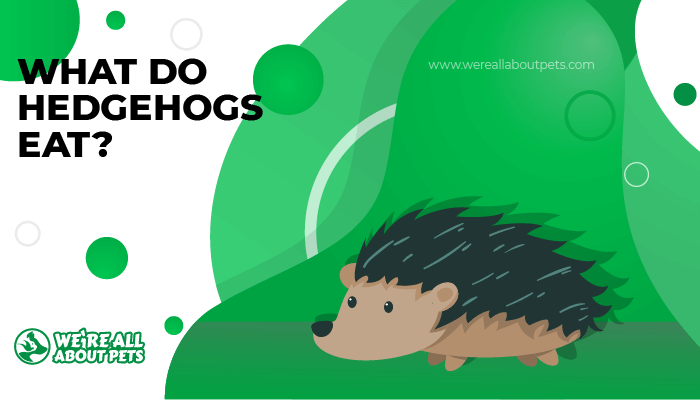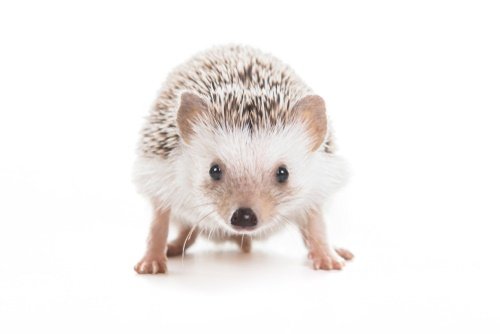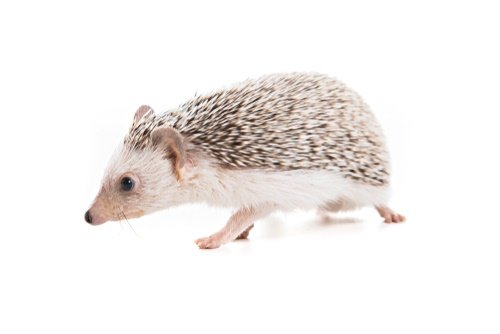What Do Hedgehogs Eat?
This page contains affiliate links. We may earn money or products from the companies mentioned in this post through our independently chosen links, which earn us a commission. Learn More

Hedgehogs are known for their spiny bodies and cute faces, but they can be more challenging to keep as pets than many people realize.
Affectionately nicknamed the hedgie, these little pets are unique from traditional pets like cats and dogs in many ways.
The pet known as the hedgie is a different species of hedgehog than the European hedgehog, the hedgehog species commonly found roaming gardens in the U.K.
The African pygmy hedgehog is native to eastern and central Africa but is actually a hybrid of two species of hedgehog: the four-toed hedgehog and the Algerian hedgehog.
Hedgehogs are insectivores, feeding primarily on grubs, spiders, snails, small vertebrates, and more. In order to keep a pet hedgehog healthy, you need to mimic this diet.
Because the hedgehog diet is so different from what you’d feed a cat or dog, these pets can be a challenge to keep.
Hedgehog owners need to provide very specific foods for their pets to keep them healthy, so make sure you’re up for the challenge before choosing this pet.
With a healthy diet, your pet hedgehog can live about 5 years. Unfortunately, it’s not as easy as just picking up a bag of dog food or dry cat food at the pet store – the hedgehog has unique dietary requirements.
Your pet hedgehog is your responsibility, so it’s your job to know what foods are and are not safe for him to eat. Read on to learn more about what makes up a balanced diet for hedgehogs.
Quick Navigation
Types of Hedgehog Diets
Hedgehogs are insectivores, so insects make up the majority of their diet.
What you really need to know, however, is that the most important part of that diet is chitin. Chitin makes up the hard exoskeleton of most insects and provides your hedgehog with a source of protein and fiber.
Though chitin is one of the most important elements in your hedgehog’s diet, it isn’t the only thing he needs. He also needs healthy fats and essential vitamins and minerals.
Overall, a hedgehog’s diet should be high in protein and low in fat. Fortunately, hedgehogs aren’t picky eaters, so you can feed your hedgehog a variety of foods to keep him healthy.
Also Read: 200 Awesome Hedgehog Names
A commercial hedgehog dry food is the best nutritionally balanced diet, though you may want to supplement it with other foods as well.
Here is a quick breakdown of the different components of a pet hedgehog’s diet:
- Commercial Kibble – These hard foods are nutritionally balanced to provide everything your hedgehog needs, so they are generally the best way to provide for his nutrient requirements. Also, the crunchiness of hard foods helps to keep a hedgehog’s teeth healthy and strong. Be aware, though, that hedgehog kibble is not always made with high-quality ingredients. Adult cat food is often recommended as an alternative for hedgehog kibble.
- Insects – Live or freeze-dried insects can be used to supplement your hedgehog’s commercial diet. Just be sure to offer a variety because some are higher in protein or fat than others.
- Fruits and veggies – Your hedgehog may enjoy small amounts of cooked, low-starch veggies like green beans and squash, as well as some fresh fruits. For fruits with skin (e.g., pears), be sure to remove the skin before feeding because the skin can be a choking hazard for hedgehogs.
- Cooked Lean Meat – To help meet your hedgehog’s protein requirements, you can offer small amounts of high-protein canned cat or dog food, as long as it is low in fat and carbohydrates. Small amounts of lean meat, such as cooked chicken, can be offered as well; do not fry or season the meat.
- Treats – Though treats shouldn’t make up the majority of your hedgehog’s diet, they can offer occasional variety. Things like pinky mice, insects, or a piece of boiled egg make great treats. Be mindful that treats might cause your hedgehog’s feces to change color or become a little stinky.
Commercial hedgehog food may be the best option for your hedgehog, but it shouldn’t be offered alone.
In the next section, you’ll receive specific information about meeting your hedgehog’s nutritional needs with a variety of foods, including hedgehog kibble, insects, and fresh foods.
Meeting Your Hedgehog’s Nutritional Needs
Because your hedgehog requires specific nutrients in his diet, a commercial hedgehog food is the best option.
These hard foods are formulated to provide the optimal blend of nutrients that your hedgehog needs, so they are a much better option than dog food or cat food.
Look for a hedgehog kibble that contains at least 30% protein and up to about 15% fat.
Avoid hedgehog kibble that contains a lot of dried fruit or vegetables, and be sure to supplement your hedgehog’s diet with live or dried insects as well.
If you’re going to feed your hedgehog insects to supplement his commercial diet, be careful how you go about it. It’s best to use pet-quality, farm-raised insects so you can be sure they’re free from pesticides – you can’t be sure with wild-caught insects.
You can find things like mealworms, wax worms, and crickets at your local pet store or order them online.
When feeding live insects, be sure to gut-load them first with high-quality, nutritious foods so that the nutrients are passed to your hedgehog.
When it comes to how much you need to feed your hedgehog, be careful. Pet hedgehogs are prone to obesity because they are less active than wild hedgehogs.
Most adult hedgehogs do well with 1 to 2 tablespoons of kibble per day, with up to a teaspoon of fresh fruits or vegetables and a few insects.
You don’t need to offer fresh fruits and vegetables every day. When offering insects, try to switch it up from day to day.
Remember, some insects have higher protein or fat content than others, and you’re striving for overall balance in the diet.
Refer to the chart below to give you an idea of what a pet hedgehog eats and how much you should be feeding your pet hedgehog in different stages of life:
Daily Hedgehog Feeding Chart |
||||
| Age | Size | Commercial Pellets | Veggies and Fruits | Insects |
| Up to 4 weeks | Baby | Mother’s milk or formula only | ||
| 4 weeks to 8 weeks | Baby | Phase out formula, transition to puppy or kitten food | ||
| 2 months and up | Adult | 1 to 2 tablespoons per day | 1 teaspoon daily cooked veggies and/or fresh fruits | 2 to 3 (vary from day to day) |
| Pregnant and nursing mothers | Adult | 1 to 2 tablespoons per day | 1 teaspoon daily cooked veggies and/or fresh fruits | 2 to 3 (vary from day to day) |
In addition to providing your hedgehog with a balanced diet, you also need to make sure he stays hydrated.
For juvenile hedgehogs, a shallow dish of water is recommended. Make sure that the water is fresh and clean.
Adult hedgehogs may learn to drink from a water bottle – just make sure to clean and refill it once a day. Your pet may also get some hydration from moist foods like fruits and cooked veggies.
Recommended Commercial Hedgehog Foods
Remember, your hedgehog is an insectivore, but you may have trouble creating a balanced diet feeding him insects alone. A commercial hedgehog food or kibble is the best option because it is nutritionally balanced for hedgehogs, unlike kitten food or canned dog food. Your hedgehog’s diet should be about 30% protein and up to about 15% fat.
Here are some of our top picks for the best commercial hedgehog food:
- Spike’s Delite Hedgehog Premium Diet – Carefully cooked for safety, this hedgehog kibble includes a combination of chicken, fish, and soy protein with added vitamins and minerals to provide your hedgehog with a nutritionally complete diet.
- Hedgehog Complete – Made with multiple protein sources for shrimp, crab, tuna, and freeze-dried mealworms, this kibble is also fortified with omega-3s, probiotics, vitamins, and calcium.
- Sun Seed Sunscription Via Hedgehog Food – A wholesome recipe made with no artificial additives, this hedgehog food features animal protein, soy protein, and dried mealworms.
Looking for more recommendations on what to feed your hedgehog? Check out our in-depth guide to the best commercial hedgehog foods.
Safe and Unsafe Foods for Hedgehogs
Now that you know about the basics of a pet hedgehog’s diet, let’s take a look at the foods that are safe and unsafe for your new pet.

11 Foods That Are Safe for Hedgehogs:
- Commercial hedgehog pellets
- Mealworms
- Wax worms
- Crickets
- Silkworms
- Grasshoppers
- Cockroaches
- Earthworms
- Caterpillars
- Butterworms
- Phoenix worms
18 Foods Hedgehogs Can Eat in Moderation:
- Cooked eggs
- Cooked chicken
- Cooked fish
- High-protein, low-fat canned dog food
- High-protein, low-fat canned cat food
- Pinky mice (pre-killed)
- Fresh tomatoes
- Fresh green beans
- Cooked squash
- Apples
- Bananas
- Berries
- Melons
- Peaches
- Mango
- Pears
- Cottage cheese
- Unsweetened yogurt
10 Foods That Are Not Recommended for Hedgehogs:
- Dried fruits
- Dried vegetables
- Corn
- Potatoes
- Carrots
- Whole grains
- Processed foods
- Sugary foods
- Wild insects
- Superworms (may bite)
16 Foods Toxic or Harmful for Hedgehogs:
- Avocado
- Pineapple
- Citrus fruits
- Grapes
- Raisins
- Milk
- Onions
- Garlic
- Potatoes
- Tomatoes
- Mushrooms
- Raw meat
- Raw eggs
- Nuts
- Seeds
- Chocolate
In summary, hedgehogs can eat a variety of foods to be healthy. Make sure that your hedgehog’s diet is high in protein and low in fat, with the occasional tasty treat to keep things interesting.
Hedgehog Feeding FAQs
What do hedgehogs eat in the wild?
Wild hedgehogs are insectivores, so they primarily eat insects they can find in their environment like grubs, worms, and spiders. Pet hedgehogs are insectivores as well, but many do well on a commercial hedgehog kibble that is nutritionally balanced.
How much do hedgehogs eat?
An adult hedgehog only needs 1 to 2 tablespoons of kibble per day with 1 teaspoon of fresh fruit or cooked veggies. Larger hedgehogs may need a larger amount of food, but it’s important to avoid overfeeding because these pets are prone to obesity.
What do hedgehogs drink?
Hedgehogs drink water so they need a water bottle full of fresh water cleaned daily.
Do hedgehogs eat insects?
Yes, insects make up the majority of a hedgehog’s diet.








